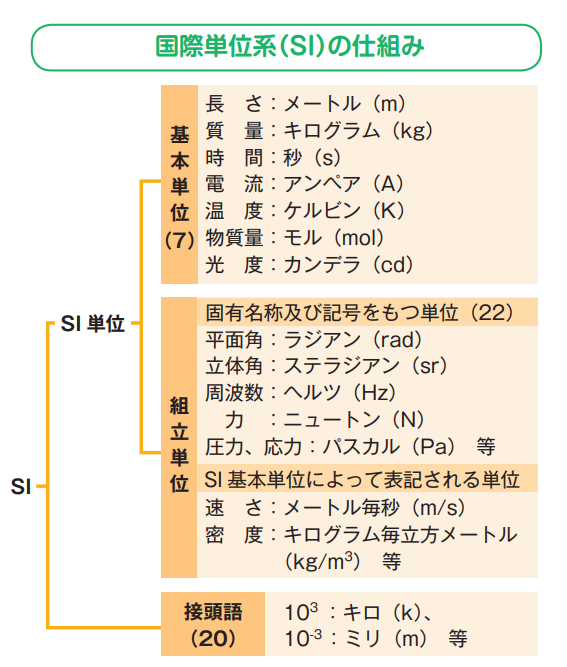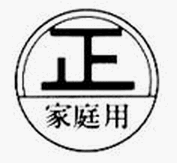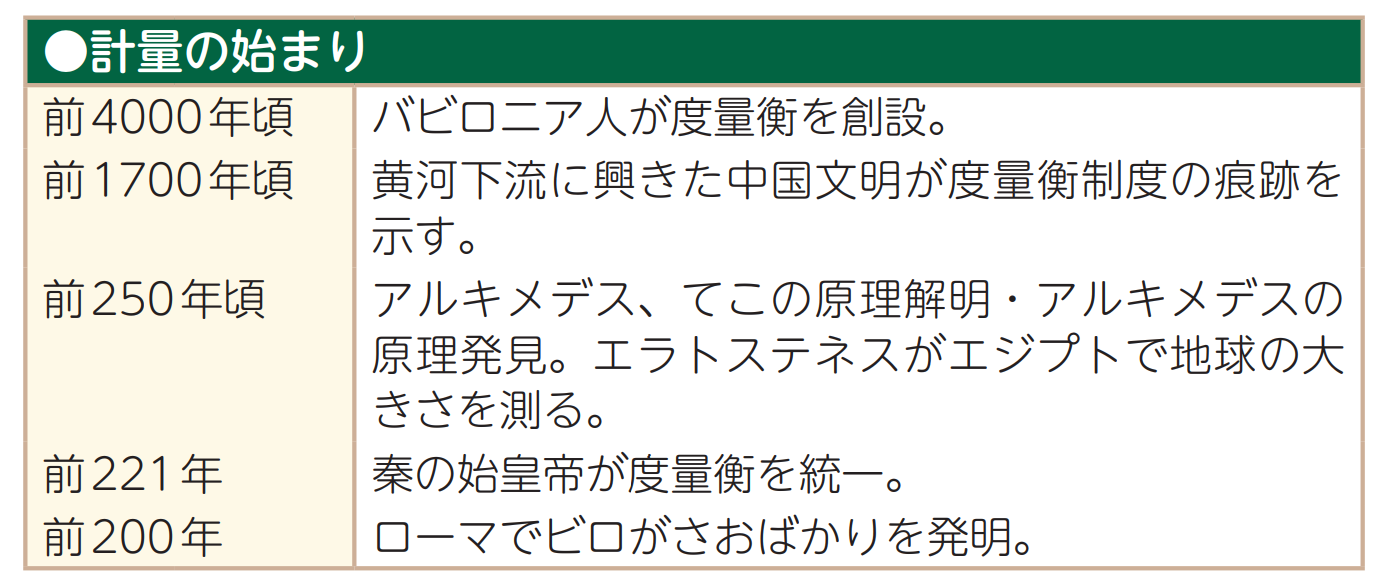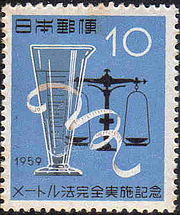If you want to import and sell scales, let's roughly study the weighing method – Part 1

Hello. It is the moat of the caretaker.
Although it is not in the title of this site, there is a law under the jurisdiction of the Ministry of Economy, Trade and Industry called the Metrology Law along with PSE, PSC, etc.
From the viewpoint of general distribution, the Metrology Law has the impression that it is a little maniacal law compared to PSE etc., but its history is much older than PSE (electrical appliances) etc., and in Japan, the origin is the Great Treasure Rule Ordinance of 701 It will go back to the beginning.
The act of "measuring" (measuring, weighing, measuring, etc.) length, quantity, weight, so-called weights and measures is indispensable for our lives, and for example, the amount of water, gas, and electricity used, the amount of refueling at gas stations, the weighing of food, thermometers, blood pressure monitors, and scales for health management, various weighing instruments are used.
In addition, there are weighing instruments used for air pollution measurements to monitor the environment, and the act of "weighing" is closely related to daily life.
Currently, there are the following units of measurement in the world.

Citation: Tokyo Metropolitan Metrology Inspection Office_Measurement method to protect life
There are many familiar units such as length: meters, mass: kilograms, hours: seconds, currents: amperes, etc., but if you think about it for a moment, it is very amazing that these units are unified in the international community.
For example, the metric standard (unit) was established in France at the end of the 18th century with the aim of establishing a uniform unit system that can be used universally throughout the world.
To be more specific, I would describe the decimal system of units based on the meter (French: mètre), which is a unit of length, and the kilogram (French: kilogramme), which is a unit of mass.
As a background to the creation of such standards, while the scope of human action was limited until then, it was sufficient if the units were unified only in that country or region.
However, as the scope of human activities has expanded and international transactions have come to be conducted, disparities in units have become a major problem.
For example, in the Edo period, Japan naturally used units that were different from those of other countries around the world, but one of the reasons why Asian countries were able to achieve rapid internationalization in the 19th century after the Meiji Restoration was that they quickly switched units to international standards.
On this site, the explanation of the system for the target certification is omitted as much as possible, and it is written with an emphasis on how to authenticate.
However, with regard to the Metrology Law, I think that it is impossible to understand why this law is so complicated unless you have a rough understanding of the history of measurement (weights and measures), which is the premise of the law.
To put it bluntly, I can write as much as I want if I try to write as a maniac, but from the perspective of a business person, I will summarize the necessary and sufficient contents that you need to know.
In addition, if you are reading this page and want to import and sell weighing products, it will be mainly household specific weighing instruments (general weighing scales, infant scales, cooking scales).

a round mark that is required to be displayed on a household specific measuring instrument
I will write about the authentication method next time.
This time, I will briefly explain the history of the measurement method.
Contents
A rough history of weighing (world history)

I looked at some of the materials, but there are some tables like the figure above, and they are very neatly organized, so I quoted them.
It is said that it was more than 10,000 years ago that humans originally started "hare" though it is said that it is as described above as a historical fact (record). In the beginning, for hunting, gathering, and farming, it seems that the moon was full, the width of the fingers, and the amount scooped by the hand, etc. were used.
At that time, it is presumed that human beings were weighing only in each region without interaction or trade with other regions.
And time went on, and the method of weighing evolved from one to another. And in the world of weighing, a revolutionary event occurs in human history.
Qin's First Emperor
The First Emperor of Qin, who is also famous for the manga "Kingdom" currently serialized in Young Jump. The manga is drawn from the point of view of the First Emperor, but historically his reputation (merit and guilt) is greatly divided.
On the other hand, however, some of the projects he conducted still have their original form even after more than 2,000 years have passed, and from that point of view, it can be seen that he was a tremendous person.
One of the projects is the unification of money, weights and measures, etc.
Until the unification of the Qin dynasty, China was called the Spring and Autumn Warring States Period, and the seven kingdoms of Qin, Chu, Qi, Yan, Zhao, Wei, and Han were vying for supremacy.
At that time, each country had its own money, weights and measures, and by unifying them, power was also unified.
This is an important point, and to put it simply, there is a logical development that by unifying things that are closely related to daily life, unnecessary accidents and conflicts will disappear, communication between people who use it will become active, and it will lead to the pacification of the national land.
Personally, I feel that this is also the origin of the system of "certification" that still exists today. The unity of nations begins with the unification of weights and measures.
Here's a quote below of what he actually did.
The bronze coin issued by each country in the warring states issued the unified currency of half-coin because the one circulated such as cloth coin, sword coin, and yen was different. Moreover, the step of the unit of length (degree) was first defined as six shakus in the weight and measure, and the standard instrument of "Measure" (Qin Gon) which measured "Masu" (Qin amount) and weight (weight) which measured the amount was manufactured and distributed to the whole country. (Omission) Also, "Car gauge" was unified, and the wagon was made to be able to run by the same rut (The gauge of the railway car was unified if it said in the present age, and jr and the private railway were able to run the same train though a concrete width etc. were not known).
Quote: Window of the World_First Emperor
Metric
As I mentioned earlier, it is a unified unit system for length (meters) and weight (kilograms) born in France at the end of the 18th century.
The contents themselves are very heavy and long, but I will o'o'm over the origins because they are a little off from the purpose of this time.
Measurement Methods in Japan
Daiho Ritsu-rei
In 701 A.D., textbooks are the first national governance system established in Japan led by Emperor Bunmu at the time.
In the background, in the international situation in East Asia, which is tense, such as the destruction of neighboring Baekje, It was necessary for Japan (japan at that time) to maintain its independence as a nation by promoting centralization and stabilizing the government.
While various laws were enacted for national unification, the system of weights and measures that had fallen apart in various places until then was unified.
This is the beginning of the current "measurement method" in Japan.
Using measuring units and measuring instruments based on the measure-kan method originated in China, and the measurement system also established a weights and measures system modeled after the rule-of-law system of Tang Dynasty.
As a result, taxes, money, and land systems, which form the basis of the nation, were established.
Taiko Checkpoint
It refers to the farmland checkpoints that Toyotomi Hideyoshi, who became taiko during the Azuchi and Momoyama period, where the Warring States Period ended, went nationwide.
I will omit the details of the system, but to put it broadly, we aimed at further stabilization of the nation that we united the whole country by arranging the rights of land and unifying the units that were disjointed in various places at that time.
I quote wikipedia for the significance of the checkpoint.
Accurate information which becomes the basis of the system afterwards such as the approach benefit to not only the innovative meaning that the arrangement related to the right relation and the unit union was aimed but also the eximation of the tribute to the farmer, the femist, the vassal, the military service imposition, and the family case, etc. is centrally concentrated and understood, and the meaning is large.
Citation: wikipedia_ Taiko Checkpoint
Easily review the significance of the measurement method
It is weights and measures to be able to be called the basis of the maintenance of the legal system to the union of the nation though it has seen in the first emperor of the Qin, the Great Treasure Ritsu rei, and the Taiko public prosecutor's office, etc.
As you can see, for example, what Mr. A weighed is 500 g, while what Mr. B weighed is 1 kg. In addition, mr. C is 1m if it measures, but Mr. D is embarrassed because it is 1.2m.
There is a history of unifying it as a nation because a useless fight is born from such a place, and it becomes a obstruction of a smooth business act.
And the times flow, and the unification comes to advance not only by one country but on a world-by-world basis.
Internationalization in Japan from the Viewpoint of Measurement Law
Accession to the Metric Convention
There is a very easy-to-understand explanation without summarizing it, so I will quote it as it is.
Let's take a look back at the measurement system of modern Japan since the Meiji era. In 1875, when the weight control ordinance was promulgated, the M2 Treaty was established in France, and Japan joined in 1885 (Meiji 18), and in 1890 (Meiji 23) received the meter prototype and kilogram prototype at the same time as western countries. It was fortunate that Japan was able to shift to the metric system without sticking to the traditional shakukan method, and there was a measurement system of japan's measurement system modern Japan until the Edo period in the age of the revolution called Meiji Restoration. It can be said that one of the foundations on which Japan has become a technological power is that japan's modern measurement system has progressed along with the metric system.
Quote: Tokyo Metropolitan Metrology Laboratory_Exploration! The World of Weighing_History of the 4th Measurement System
When we talk about the modernization of Japan, we talk about the development of wealthy and powerful troops and armaments, but behind this is the development of such laws.
As a famous place that everyone knows, with the enactment of the Constitution of the Great Japan Country, there is a legal system construction such as appointing a Taisei as a central government to oversee the power of the state and dividing the power of the Taisei into the three powers of legislative, executive, and judicial, but more specifically, there is also the adoption of the metric system.
Dissatisfaction in various parts of Japan
However, on the other hand, it seems that dissatisfaction and resistance by the common people in Japan remained quite strongly in Japan, especially in response to the fact that the unit of measure that we have used so far, for example, shaku, kan, monme, etc. can not be used.
If what we have been using in business etc. suddenly changes direction, it is natural for anyone to state an objection.
If you think so, I think the Meiji government at that time was quite radical, and it can be said that it had a passion for internationalization that much.
The government has since suppressed the persistent opposition in Japan, but it is not completely prohibited, so it seems that there are still people who do measurement notation from ancient Japan among individuals, and some tools that are easier to use with such notation.
Enactment of the Metric System
If you trace the detailed history, it will become as fine as you can again, so I will quote the material of the Tokyo Metropolitan Metrology Inspection Office that is neatly settled again.
Subsequently, in 1891, the Metric Law was promulgated in accordance with the Western measurement system, and in 1951, after the end of World War II, the New Constitution and local autonomy law was enacted, and a democratic and rational new measurement system was launched by promulgating the "Measurement Act" adapted to changes in the social and economic environment from an international perspective.
Quote: Tokyo Metropolitan Metrology Laboratory_Exploration! The World of Weighing_History of the 4th Measurement System
To add a little, in 1959 (Showa 34), except for the tsubo notation of land and buildings, the metric system was fully implemented, and on April 1, 1966 (Showa 41), the metric system was finally fully implemented.
By the way, in 1959, stamps commemorating the full implementation of the metric system were released, and the government's desire to conduct metering administration is transmitted.
Since then, there seems to have been a persistent opposition to the government's unisternal measures, but we have overcome them and have reached the current quantitative administration.

Quote: wikipedia_ Metric
To be honest, it is difficult to sell products subject to the Measurement Act.
I have seen the history of the Metrology Act in a hurry, but it is a law that has a long history and repeated government intervention, and it is difficult for general operators to enter the market so that PSE, PSC, Radio Law, etc. look cute.
Frankly, there will be many other things that can be sold without forcibly choosing products related to metrology.
However, it is not impossible to enter the market, so please wait for the next article on obtaining metrology methods.
Lastly, I would like to say that we aim to facilitate communication by unifying weights and measures, but even so, human beings have repeatedly fought wars and conflicts.
That doesn't mean it's futile, but I think it's always the wisdom of people who are always trying to move forward.
By the way, even in Japan, this metrology law exists in the name of the beauty that metrology is the foundation of the nation, and there are many concessions, and to be honest, from the standpoint of people in the outfield, such questions arise as to whether weighing inspection stations in each prefecture are really necessary.
However, no matter how you say this, the law called the Metrology Law is established that way, and I think it is very important to understand such a system in order to certify it.

